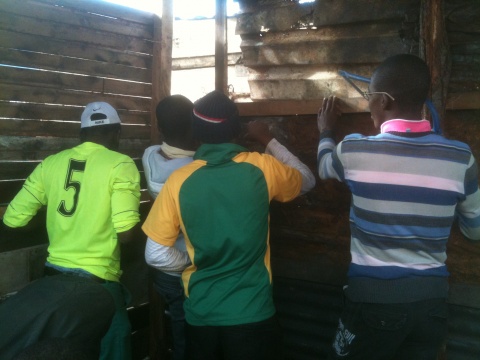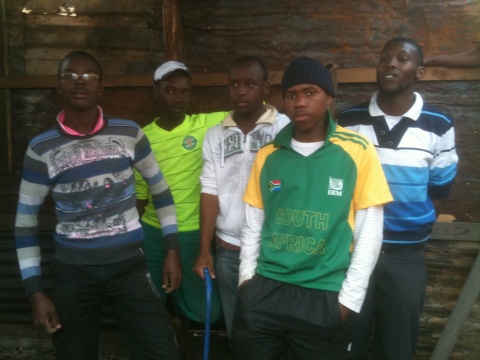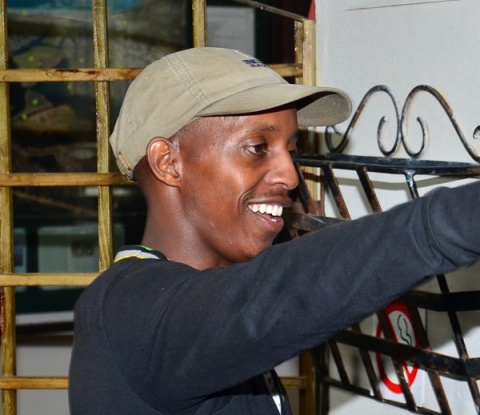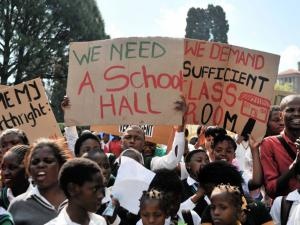
Following the devastating fire in Masiphumelele on 2 May which destroyed over 1000 homes, ikamvanites have been juggling their schoolwork and IkamvaYouth tutoring and winter schools with having to rebuild their homes and recover after losing all their posessions.
[youtube]0-nKHMgCYp0[/youtube]
Thankfully, the Masi branch has garnered support from many numerous donors, including Foschini, Masi Corp and a number of individuals (including Alex, Andy Sudermann, Philipp Schmidt, Charlotte and Tim Sun). The positive effect of these investments enabled the ikamvanites to replace their stationery, schoolbooks and uniforms, and build and better insulate their homes.
The improvements have allowed homes to be functional again and a certain amount of normality is returning to these learners lives. The first stage of this project has ensured that each learner has adequate shelter in which to live and to study.
The ikamvanites and their families send out the following thanks:
“Hi all, I just want to thank you for helping me. Often I’ve been told not to get my hopes up but now I know that I can get them up because there are people like you. You’ve shown me that I can hope to someone. Guys I don’t know what to say really because you’ve done a lot for me and my family, so all I can say is ‘Thanks’ and I appreciate everything because we could not have rebuilt my room without your help. I just so wish that I can see and than you face to face or to be able to give back to you one day!” Sandiswa Bani
“I write this letters just to show appreciation. I thank you from the bottom of my heart. What you did for me and others was a good thing and by writing this letter I am showing my never fading gratitude. I now have a safe and warm home because of you. Thank you so much. They say a hand that gives is blessed. The same kindness will be shown to you.” Zintle Nyaniso (Grade 10 Ikamvanite)
I Aphiwe from IkamvaYouth just wanted to show my appreciation a big big thank you for what you guys have done for me. You give me everything I needed and I am so happy for these things that you give me. Really really thank you you guys inspired me to make a lot easier for me. Don’t give up with what you are doing. Keep on doing it. You will make a difference to South Africa. It will take long, but don’t get tired we need you.
My name is Khanya Gutyana. I would like to thank you for everything you have done for me for all of us Ikamvanites affected by the fire. You helped us a lot. Some of us didn’t know where to start. Even our parents didn’t know how to begin rebuilding our lives. But you helped us. Thank you so much guys, we appreciate everything you have done for us.
Hi. I write this letter to say thank you very much. You have helped us so much. I always say to bless a person that helps others. You have shown care, love in what you have done for Ikamvanites in Masiphumelele. It makes me realise that there are people who care and people who make me feel special. Sihle Nini (Grade 10 Ikamvanite)
I am writing this letter to say thank you for the money that you gave to us. It will help us a lot and also we appreciate the work that you are doing for us because it means a lot and shows me that people care. Avile Mabengu (Grade 11)



In January I started coughing, losing weight, sweating and I got sick until I was very weak. When I went to the clinic, the worse news I got, came as a shock to me that I was diagnosed with TB. I was immediately started on treatment.
I visited the clinic again to get the final results after six months, the male nurse who was responsible for my file, was not there, because he was on a training course, but ultimately on the 27th of July 2011 I found him, and the best news I ever got was that, “My boy you are discharged from TB treatment, your results are clear” he said. The nurse, who received me for the first time in that clinic, told the other man who was just diagnosed with TB to look at this boy, he is such a good example, he has just completed his treatment and is cured of TB.
Watch: http://www.youtube.com/watch?v=mta8uxSIN78
I would like to thank all the people who were supportive during my time of shock and disbelief. I would like to encourage those who are afraid of testing for TB when they are coughing to do so and adhere to TB treatment because if I can beat it, you can also beat it.
Emmanuel – IkamvaYouth Ivory Park. Grade 10.


Mphumzi Klaas passed away on 26 June. Ikamvanites are grieving for this amazing colleague, tutor, mentor and friend. Mphumzi has been integral to IkamvaYouth since he joined in 2005, while doing grade 11. He has since fulfilled various important roles at the Makhaza branch, and has been an inspiration and friend to hundreds of ikamvanites. When introducing himself to visitors, he’d proudly say that he does “a little bit of everything” at IkamvaYouth, and it was true. Besides keeping the Makhaza branch going and consistently aiming higher, Mphumzi was the glue of the Makhaza family with his deep commitment and great sense of humour.
The memorial service is on the 6th of July 2011 at Desmond Tutu Hall. It will start at 17:30 until 19:00. Click here for the directions from town, and contact me direct 0789929269 if you get lost.
The funeral is on 9 June at Solomon Mahlangu Hall, next to Harry Gwala High School / Kuyasa train station. It will start at 9:30am until 12o’clock.


The much-anticipated 2010 Annual Report is out!
A huge thanks to volunteers Lynne Stuart for the very beautiful design and layout, and to Julia de Kadt for proofreading.
The Report is a multi-media feast, with links to blog posts and youtube clips throughout. Take some time out to learn more about IkamvaYouth and the ikamvanites’ remarkable stories of 2010, share the links you like and enjoy!


IkamvaYouth is happy to report that three ikamvanites were featured in the Mail & Guardian’s 200 Young South Africans list:
We’re looking forward to congratulating our first cohort of ex-learners to make the list in the future 🙂


At the beginning of every year, 1.3 million children begin school in Grade 1 but only 550 000 write Matric. Of these, only 68% will pass. And of these, 25% scrape through with 30s and 40s.
The effective Matric pass-rate in South Africa every year is thus actually closer to 29%.
And this is before we even begin to look at university retention rates and the spine-chilling FET college pass rates. I often say to people that as bad as you think the education landscape in South Africa is, it’s actually worse.
Which brings me to the conclusion that if this is not a YOUTH ISSUE then I don’t know what is.
There is surely no more pressing concern for young people across this country than the dismal state of education that every year systematically robs them of their futures.
How is it then that education will barely feature at this weekend’s ANC Youth League elective conference as representatives of the most influential youth movement in the country meet to discuss their plans for the next four years? Can we not see that the chains of poverty are firmly entrenched in the dysfunctionality of our schools? Do we not realise that the failure of our education system is causing as much damage as the race-based policies of old? Are we so blinded by our personal agendas so as to be unable to distinguish between what will alleviate poverty and what will entrench it?
The ANCYL is absolutely correct and justifed to point out that we need more equitable and more workable solutions to the massive problems of land reform, to righting past injustices and to creating broad-based economic inclusion in this country (you would have a hard time arguing against this) but without the provision of quality education any/every solution will be temporary at best and exascerbating at worst. We simply cannot end poverty without the access to quality opportunities that decent education provides. This is the bottom line and it is a mantra we should repeat over and over again until we are blue in the face – we should NEVER grow tired of saying this.
I guess what is especially puzzling is the assertion that nationalisation and wholesale land redistribution on its own is a solution to poverty. Any potential solution that is not also forward-looking and does not include improving education is tenuous at best. The hard truth is that there are not too many examples around the world, if any, where nationalisation has actually lessened the suffering of ordinary people. At best, the status quo remains the same and all that changes are the ‘elite’ at the trough. But on the contrary, there are countless examples of quality education acting as a springboard towards a better future not only for individuals but for an entire country – look no further than Singapore.
But we don’t even need to look that far, at IkamvaYouth we discovered that the average first pay-cheque of a learner who joins IkamvaYouth, who improves her school marks, who gets into university and who graduates after three years will be 5 times the collective income of her entire household when she first joined IkamvaYouth. It’s as simple as that. In 5 years the cycle of poverty in a family is broken and it’s broken on the back of decent education.
We really need more creative and imaginative thought from our leaders and especially from the ANCYL as the problem of dismal education is a YOUTH problem. The empty platitude that everyone is entitled to quality education is clearly not going to cut it. This really is thus nothing short of a desperate plea on behalf the voiceless hundreds of thousands of young people to make this the number 1 priority in all programmes post this year’s elective conference.
Finally, as this is Youth Day, June 16, we cannot but think of the young people of Soweto of 1976 who so courageously took to the streets and chanted slogans like “Liberation before Education” in front of an intimidating and ruthless foe. Today however, our minds must be unalterable in confronting a foe at least as intimidating and ruthless as before and we ask you to join us in declaring that now is the time of “Liberation through Education”.
Please consider volunteering at an IkamvaYouth branch near you.
Or if you can’t volunteer please consider a financial contribution towards ending poverty.
Or at the very least, please spread the word that we simply cannot end poverty without the access to quality opportunities that decent education provides and let’s hope that this finds traction in the corridors of influence.

* Photo: IkamvaYouth learners picket with Equal Education outside the Union Buildings in April 2011.














 Lloyd Lungu
Lloyd Lungu